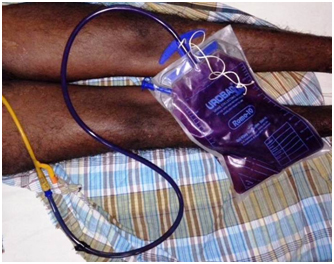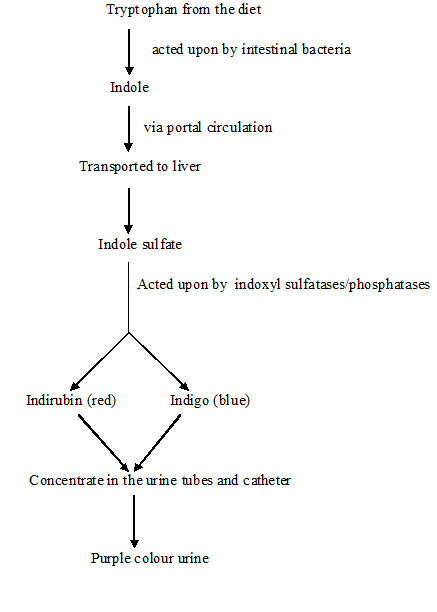Purple Urine Bag Syndrome
Naufal Rizwan Taraganar Abubacker1, Senthil Manikandan Thirumanilayur Jayaraman2, Kannan R3, Magesh Kumar Sivanesan4, Renu Mathew5
1 Assistant Professor, Department of General Medicine, Saveetha Medical College and Hospital, Saveetha University, Saveetha Nagar, Thandalam, Chennai, Tamil Nadu, India.
2 Assistant Professor, Department of General Medicine, Saveetha Medical College and Hospital, Saveetha University, Saveetha Nagar, Thandalam, Chennai, Tamil Nadu, India.
3 Associate Professor, Department of General Medicine, Saveetha Medical College and Hospital, Saveetha University, Saveetha Nagar, Thandalam, Chennai, Tamil Nadu, India.
4 Professor, Department of General Medicine, Saveetha Medical College and Hospital, Saveetha University, Saveetha Nagar, Tamil Nadu, Chennai, Tamil Nadu, India.
5 Professor, Department of Microbiology, Saveetha Medical College and Hospital, Saveetha University, Saveetha Nagar, Thandalam, Chennai, Tamil Nadu, India.
NAME, ADDRESS, E-MAIL ID OF THE CORRESPONDING AUTHOR: Dr. R. Kannan, Associate Professor, Department of Medicine, Saveetha Medical College and Hospital, Saveetha Nagar, Thandalam, Chennai – 602 105, Tamil Nadu, India. E-mail : endork@yahoo.com
Purple urine bag syndrome (PUBS) is a rare disorder seen in elderly persons, wherein the urinary bag and the tubing turn in to purple colour. It is usually seen in patients who are on urinary catheters for a long time. Purple coloured urine occurs due to the accumulation of indigo and indirubin, which are the end products of tryptophan metabolism due to the action of sulfatases and phosphatases formed by bacteria like Providencia, Citrobacter, Enterobacter, Klebsiella etc. We present this interesting phenomenon of purple urine in a young male who was on prolonged urinary catheterization. The urine culture was positive for Providencia and constipation was an added risk factor for the purple urine. The urinary catheter and tubing was changed along with a course of antibiotics which lead to the normalization of the urine colour.
Indigo, Indirubin, Pink purple urine, Providencia, Tryptophan
Case Report
A 36-year-old male was brought to the hospital for change of his urinary catheter. He had a history of fall from a tree four months back following which he developed weakness of both his lower limbs associated with urinary incontinence. He was under treatment for traumatic paraparesis elsewhere and bladder was catheterized with plastic urinary bag since then. The colour of the urine at the time of catheterization was normal and clear.
On probing the history further, the patient also revealed that he had noticed that the colour of urine had changed from straw colour to purple colour for the past six days. He also gave a history of constipation for the past few weeks. There was no history of associated fever, abdominal pain, vomiting or loss of weight. He was not a known diabetic or hypertensive. He also had no history of previous urinary problems or surgeries.
On examination, he was comfortable and haemodynamically stable. Cardiovascular, respiratory and abdomen examination were normal. Neurological examination revealed weakness of both lower limbs. Basic investigations were done which revealed a mild leucocytosis (13000/mm3) and evidence of a urinary tract infection. The findings are tabulated in [Table/Fig-1].
Blood and urine investigations
| Blood investigation |
|---|
| Hb | 13.3g/dl |
| Total count | 13000 cells/mm3 |
| Platelet count | 2,36,000/mm3 |
| Sodium | 139 meq/dl |
| Potassium | 3.9 meq/dl |
| ESR | 12mm/hr |
| Urea | 29mg/dl |
| Creatinine | 0.8 mg/dl |
| Urine examination |
| Protein | Nil |
| Glucose | Nil |
| RBC | Nil |
| WBC | 14-16/hpf |
| Epithelial cells | 1-2/hpf |
| Casts | Nil |
| Others | Nil |
| Urine Culture |
| Providencia stuartii |
The urine in the bag was strikingly purple in colour [Table/Fig-2]. Urine examination showed 14 to 16 pus cells/HPF with no RBC’s. Urine analysis for glucose and albumin was negative. Urine culture revealed the presence of Providencia which was sensitive to Ceftriaxone, Ofloxacin, Amikacin, and Co-Amoxyclav. He was started on parenteral Ceftriaxone 1 gm twice a day for a period of five days and urinary catheter was also changed. After treatment with antibiotics as well as change of the urinary catheter, the purple urine returned to its normal colour.
Urinary bag and tube showing purple coloured urine

Discussion
Purple urine bag syndrome (PUBS) is a rare condition first described in 1978 by Barlow and Dickson where the urine attains a purple colour [1]. It is commonly seen in elderly women, who have remained on a urinary catheter for a long time [2]. Constipation and usage of plastic urinary bags for bladder catherisation are the usual predisposing factors [3]. Constipation, in particular plays an important role, as it interferes with the gut motility leading to the alteration of the intestinal bacterial flora. PUBS have been even reported in patients with intussusceptions [4]. This along with dehydration and alkaline urine greatly increases the risk of developing PUBS. Our patient was on a urinary catheter for a long period with a history of constipation, which contributed to the development of purple coloured urine. The patient was a male in our report compared to the previously reported cases of purple urine which was more common among females [2].
The reason for the purplish discoloration of the urine is the accumulation of the metabolites of tryptophan [5]. Dietary tryptophan is normally metabolized by the bacteria present in the gastro intestinal tract which results in the production of indole. Indole is then transported to the liver where it is converted to indole sulfate. Certain bacteria possess enzymes like indole sulfatase and indole phosphatase which have the ability to metabolize indole sulfate. The presence of these bacteria in the intestinal tract favours the metabolism of indole sulfate, resulting in the formation of indirubin (red) and indigo (blue). These metabolites then concentrate in the plastic tubing and the catheter producing an intense purple colour [6], giving rise to the purple urine bag syndrome [Table/Fig-3]. The urine culture report of our patient was positive for Providencia which was sensitive to Ceftriaxone.
Mechanism of purple colour urine formation

Except for the alarming nature of the purple colour of the urine, the patients with PUBS are usually asymptomatic. Symptoms like fever, abdominal pain and other features of urinary tract infection are present in only a minority of patients [7]. Complications are usually not seen in patients with PUBS. PUBS was detected incidentally in our patient and he was asymptomatic without any complications which is concurrent with the reported cases.
Complete urine examination with culture and sensitivity are the usual investigations required for these patients. Blood investigations are generally not contributory. Numerous organisms have been associated with this syndrome, notable being Providencia, Citrobacter, Enterobacter, Klebsiella, Morganella, Staphylococcus and Streptococcus. As this condition is asymptomatic and usually does not lead to complications, some authors have evolved a consensus that change of the urinary catheters and the bags are sufficient enough to solve the problem [8]. Antibiotics may be prescribed based on the culture and sensitivity of the urine. Treatment of the underlying medical problem is of paramount importance including frequent change of the indwelling urinary catheter. Measures should also be taken to correct dehydration and relieve the constipation. Antibiotics and change of urinary catheter relieved the purple urine in our patient and he became better.
Conclusion
Purple urine bag syndrome is a rare and interesting condition which is increasingly seen nowadays. PUBS is a benign condition and patients are usually asymptomatic. The purple urine alerts the patient for treatment though it remains a harmless condition. The common risk factors are old age, females, constipation, alkaline urine and usage of plastic urinary catheters. Our patient was a young male with constipation and without other risk factors. Simple measures like antibiotics, changing urine bags and catheters are sufficient to solve the problem in most of the cases.
[1]. Pillai BP, Chong VH, Yong AML, Purple urine bag syndromeSingapore Med J 2009 50(5):193-94. [Google Scholar]
[2]. Joaquim PR, Paulo M, Susan M, Case report: purple urine bag syndromeCritical Care 2004 8:137-38. [Google Scholar]
[3]. Chi HL, Hsien TH, Chia CC, Purple urine bag syndrome in nursing homes: ten elderly case reports and a literature reviewClinical Interventions in Aging 2008 3(4):729-34. [Google Scholar]
[4]. Pillai RN, Clavijo J, Narayanan M, An association of purple urine bag syndrome with intussusceptionsUrology 2007 70(812):1-2. [Google Scholar]
[5]. Bin C, Shiu-Dong C, Hsiao-Chun C, Purple urine bag syndrome in an elderly womanIncont Pelvic Floor Dysfunct 2010 4(4):121 [Google Scholar]
[6]. Khan F, Chaudhry MA, Qureshi N, Cowley B, Purple urine bag syndrome: an alarming hue? A brief review of the literatureInternational Journal of Nephrology 2011 2011:4192133 pages, 2011. doi:10.4061/2011/419213 [Google Scholar]
[7]. Agapakis D, Massa EV, Hantzis I, Purple urine bag syndrome: a case report of an alarming phenomenonHippokratia 2014 18(1):92-94. [Google Scholar]
[8]. Jessica M, Nicholas B, The purple urine bag syndrome: a visually striking side effect of highly alkaline urinary tract infectionCan Urol Assoc J 2011 5(4):233-43. [Google Scholar]